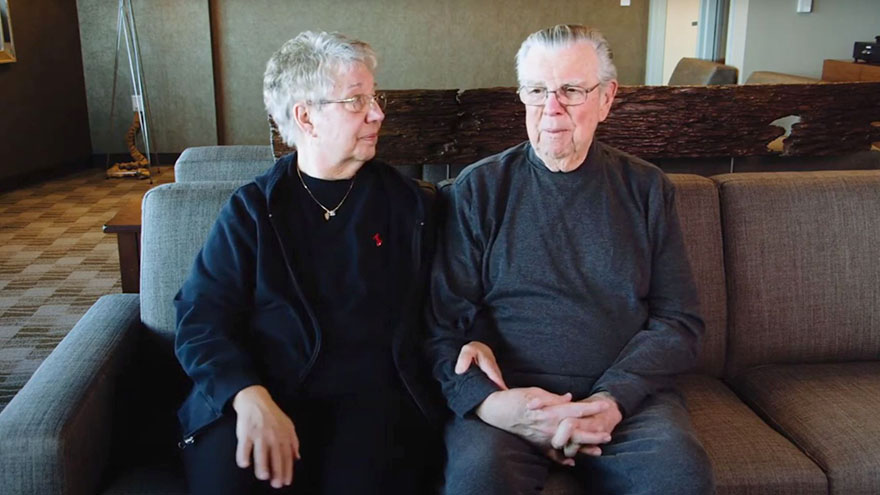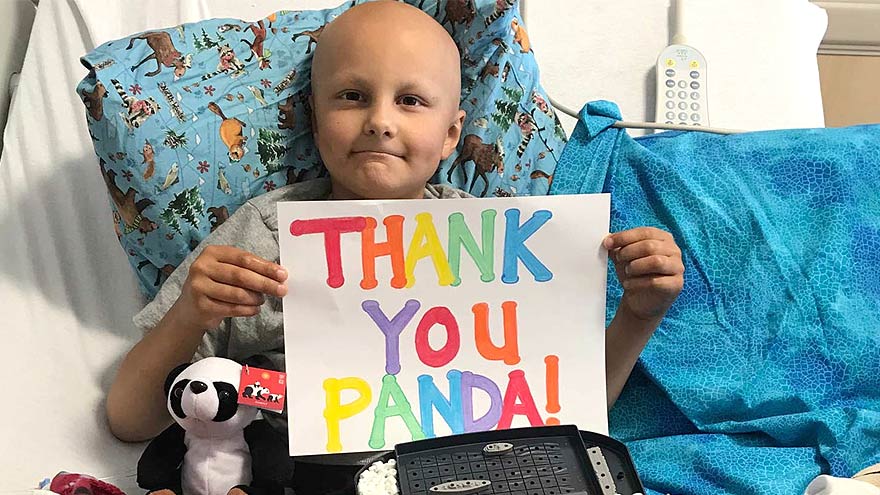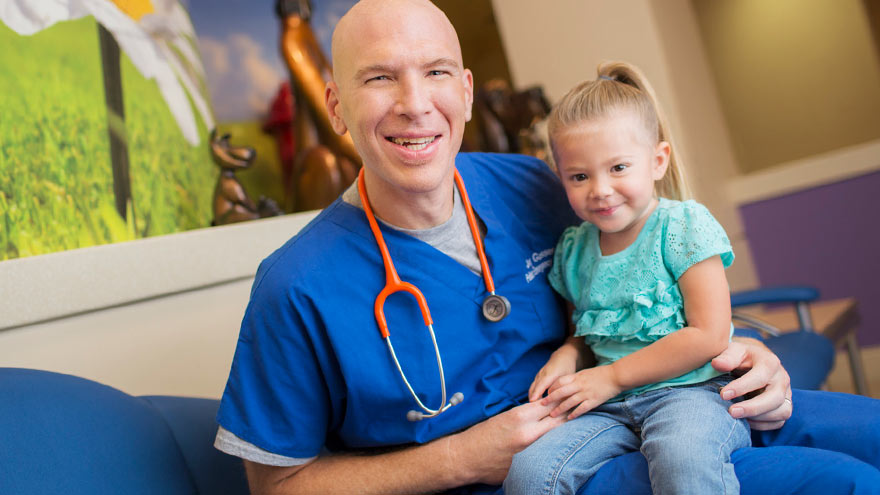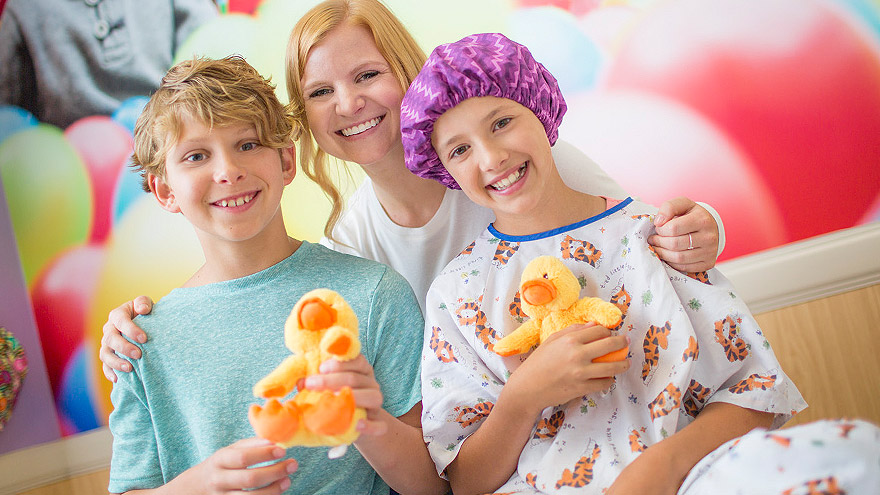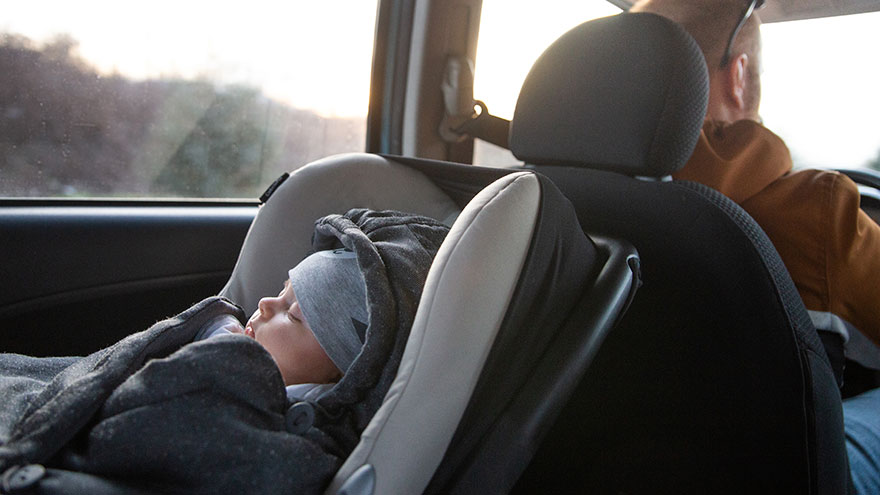Search
-
How Dorismae Reclaimed Her Life and Walking Shoes with TAVR
When lifelong trekker and adventurer Dorismae Weber learned her aortic valve was shutting down, she was afraid she was losing something she loved most: her daily walks. But following a trans catheter aortic valve implantation, Weber reclaimed her walking shoes — and her life. This is her story. An avid walker and traveler, Dorismae Weber’s life changed dramatically when she was exploring Mongolia and began having trouble breathing. Weber, 84, learned her aortic valve was shutting down. “It’s scary when you lose what you’ve always done,” Weber says. “I’ve walked all my life, and it’s always been the place I’ve gone to for comfort, for solving problems, for just enjoying. But all of a sudden, I couldn’t do this anymore.” Weber was not a candidate for traditional open heart surgery because she had heart surgery in the past. Then Weber learned about about trans catheter aortic valve implantation, also known as TAVR. She went to see Renown cardiologist Jake Ichino, MD, who put her through a battery of tests before performing the procedure. “Unlike the standard traditional open heart surgery, TAVR is a less invasive approach,” Dr. Ichino says. “We traditionally go up the artery of the leg with a catheter tube device and then we implant a valve without opening the chest.” After the TAVR procedure, Weber was once again able to complete her daily five-mile hikes. “When I woke up, all I can tell you is that I looked around and I thought, ‘I have a whole new life ahead of me — when I was told there was very little left,'” Weber says. She has also planned a trek just below the arctic circle with the environmental group Earthwatch. “I’m here because I had that procedure,” Weber says. “I’m here because they offered that procedure. And I’m very grateful for it, because I wouldn’t be here without it.” To learn more about TAVR, visit Renown’s Institute for Heart and Vascular Health.
Read More About How Dorismae Reclaimed Her Life and Walking Shoes with TAVR
-
Carl and Janis Team Approach to Renowns Healthy Heart Program
Meet a couple that's all heart. After each had a heart attack one year apart, they committed to Renown's new Healthy Heart Program and support each other along the road to heart health. Almost a year to the day that Janis VanHorn had a heart attack, her partner, Carl Edson, had one too. "That kind of doubled the dose of making sure that we were doing everything that we could to continue with our life," VanHorn says. "It's a very life-altering thing.” And after Edson's quadruple bypass open heart surgery, he was grateful for the simple act of getting into the car with the woman he loves. "I was so relieved," he says. "I didn't realize how precious life was until that moment." The couple see the same cardiologist, Richard Seher, M.D., FACC, FSCAI, who recommended they participate in Renown's new Healthy Heart Program, a 12-week, 36-visit intensive cardiac rehabilitation curriculum that includes monitored exercising and cooking classes. Now they're both familiar faces at the program, which is located at the Renown South Meadows Medical Center. After several weeks, Edson says he has lost 10 pounds and VanHorton has lost inches and feels more toned. Tackling the program together has brought the couple closer and given them the opportunity to fuel one another's health goals and longevity. "I would be lost without this man," VanHorn says," and anything I can do to help him live longer, I'm going to do that." Edson adds, "She is to me my whole life, and I mean that sincerely. There's no one else I can turn to that has helped me in my life as she has, and I'm just trying to return the favor in a big-time way. She is my everything."
Read More About Carl and Janis Team Approach to Renowns Healthy Heart Program
-
5 Tips to Keep Your Brain Nimble
Not all memory loss is inevitable — there are several things you can do to keep your brain nimble at any age. Find out how brain exercises, a healthy diet and daily movement can improve your brain’s focus. A modest decline in memory is to be expected as we get older. We forget someone’s name but recall it later. We find the need to make lists to remember things more pressing. Manageable? Yes. But frustrating nonetheless. The good news is we don’t have to sit back and succumb to age-related memory loss. There are concrete things we can do at any age to keep our brains sharp, nimble and engaged. Five Simple Brain Exercises 1. Volunteer or participate in meaningful activities outside of work. This engages your brain and emotions in a healthy, positive way. 2. Engage in moderate, regular exercise to tone body and mind. Overall good health is critical to brain health. Even casual daily walking can boost your mental abilities. 3. Eat the rainbow. Choose to include plenty of colorful fruits and veggies and ease up on processed foods in your daily diet. The proper nutrients can improve circulation to your brain, which will amp up your cognitive abilities. Consult your doctor for the best diet and supplement choices for your specific health needs 4. Get a blood test to determine your body’s hormonal and nutrient levels. Specific hormones and nutrients can affect cognition. Be mindful of your cholesterol levels, and if you take cholesterol medications, such as statin drugs, be aware they can also affect your mental faculties. 5. Engage in brain activities like reading, crossword puzzles, Sudoku and Trivial Pursuit. These types of activities can improve your brain’s focus and concentration and — most important — test your memory and general knowledge. You derive more benefit by engaging in these activities consistently for short amounts of time, so make a weekly appointment with yourself to build brainpower.
-
How to Safely Give Children Over-the-Counter Medications
How can you ensure you’re giving your children safe doses of over-the-counter medications? The safest bet: Confirming dosages and recommendations with your doctor. With that in mind, here are a few answers to basic questions about OTC medications and children. It’s cold and flu season in Northern Nevada. This means you’ll find parents in the aisles of practically every drug store, wondering what will and will not work for their sick children. Over-the-counter (OTC) medications — and their dosages, side effects, interactions and more — can inspire abundant anxiety for parents. At the outset, the U.S. Food and Drug Administration offers the following warning about use of medicines for cough and colds in children: The FDA doesn’t recommend over-the-counter medicines for cough and cold symptoms in children younger than 2 years old. Prescription cough medicines containing codeine or hydrocodone are not indicated for use in children younger than 18 years old. Codeine and hydrocodone are opioids that are available in combination with other medicines, such as antihistamines and decongestants, in prescription medicines to treat cough and symptoms associated with allergies or the common cold for adults. Caregivers should also read labels on OTC cough and cold products, because some might contain codeine. So how can you feel comfortable administering any OTC medication to your children? The short answer is: Check with a doctor first. And with that in mind, here are a few common questions and answers from Kristin L. Wilson, MD, of Renown Pediatrics about children and OTC medications. Please talk about the importance of correct dosage of pediatric medications. Pediatric dosing is weight-based and unique to each medicine (and sometimes even the circumstance you are treating.) Therefore, there are no standardizations of “safe” amounts that apply to all medications. What are signs of an overdose of pediatric medications? Signs of intoxication/overdose are also unique to each medication and supplement. And to make it more confusing, mixing current prescriptions with various supplements or over-the-counter medications can cause significant adverse effects as well. Is there an age at which children take adult over-the-counter medications? Infants through adolescents can take medications that are also prescribed to adults, but only under a healthcare provider’s careful guidance. Dosing is determined by various factors dependent on child’s age and also medical history, as above. What is the takeaway about administering medications to children? When in doubt, ask a healthcare professional whether a medication or supplement is safe for your child based on his/her age and medical history as well as recommended dosing based on recent weights and other vital signs.
Read More About How to Safely Give Children Over-the-Counter Medications
-
Panda Cares Center of Hope at Renown Children's Hospital
When you have an ill child in the hospital, it is a stressful event. And Panda Express is helping local families support children who need special care. Their generous donation provides much-needed equipment, programs, and resources via the new Panda Cares Center of Hope, Renown Children’s Specialty Center. Their partnership directly benefits patients and their families! The ‘Panda Cares Center of Hope, Renown’s Children’s Specialty Center’ In fact, this new center provides care to not only children, but also comprehensive support to the entire family. Similarly, it creates an environment that reduces stress, promotes healing, and provides a superior patient and family experience. This facility upholds Panda Express’ mission, vision, and values and its four pillars: to directly help fund the emotional, mental, physical, and spiritual needs of children. This center, the first-ever in northern Nevada, will provide care for children who have chronic conditions. In particular, it offers ongoing treatment, health management, and specialty medical services, including: Nephrology Endocrinology Neurology Pulmonary Infectious Diseases Medical Genetics Adolescent Medicine How You Can Help! When you order from Panda Express, you can opt to round up your change, which will help support programs and services, such as the Center of Hope for Renown Children’s Hospital. Order Online A Partnership for Health & Education of Underserved Youth This partnership allows Renown Children’s Hospital to continue to strengthen regional services and increase Panda’s visibility within our growing community. Last year, 21,930 sick children received care from Renown Children’s Hospital. To date, Panda Express has raised $449,200 in financial support to assist us in providing health and education to every child, regardless of illness, injury, insurance, or ability to pay. Panda Express funds have already supported: Giraffe omni beds for the NICU Ultrasound machine for the Children’s ER Panda warmers and a hand held Accuvein machine Child Life Program to support sick patients and families Meeting room in the Children’s Specialty Center In kind donations, volunteer time and support of local events such as the University of Nevada Reno, Wolf Pack Dance Marathon
Read More About Panda Cares Center of Hope at Renown Children's Hospital
-
Keeping Pediatric Care Close to Home
As our community grows, so does the need for specialized care. Thanks to a generous gift, there’s a healthier future for families in the region as a $7.5 million gift to the Renown Health Foundation is helping keep care close to home. Being in the hospital is often a stressful experience, especially for a child and their caregivers. If you add the need to travel out-of-state for care into the mix, unnecessary anxiety and financial burdens can be placed on a family that is already worried about a sick child. With our quickly growing community and close to 100,000 children under the age of 18 in Washoe County alone, the need for local specialty care is needed. The William N. Pennington Foundation recognized this need and donated $7.5 million to the Renown Health Foundation – the largest gift the health system has received – to keep care close to home and establish the William N. Pennington Fund for Advanced Pediatric Care. Thanks to this gift, Renown Children’s Hospital has hired more than 15 pediatric specialists who provide care for children in our community. Below, we introduce you to three key specialized pediatricians in northern Nevada: Joseph A. Gassen, M.D. “Having pediatric specialists in the community is invaluable,” says Joseph A. Gassen, M.D., pediatric emergency medicine. “It allows families and patients to stay in Reno and not have to travel far distances to get quality care.” Gassen, the only doctor specializing in pediatric emergency medicine in the region, moved to Reno to provide care in the emergency room at Renown Children’s Hospital. “The hospital is dedicated to improving the care of children in northern Nevada, and I wanted to be a part of this amazing vision," Dr. Gassen says. I would not have been able to relocate to Reno without the support from the hospital and the William N. Pennington gift.” Working with children and their families are what Dr. Gassen finds most rewarding. "I get to provide care for a child, which in turn makes the parent feel better,” he says. “Essentially, I get to treat the whole family, even though I only directly care for the kids.” Colin Nguyen, M.D. Also among the first new specialists is Pediatric Neurologist Colin Nguyen, M.D., who has done extensive work with epilepsy and epilepsy surgery. “In any growing and expanding community, we need the multitude of social, financial, political and well-being services to sustain that growth and progress,” Dr. Nguyen says. “The ability to offer more breadth of medical services to our local population allows families to spend more time together and fulfill work obligations, without the need to travel long distances to obtain that specialized care.” Dr. Nguyen says he enjoys caring for children because they are honest in their emotions and reactions, as well as simple in their intentions. “It is the overall joy and unique sadness that comes in working with children, which drives many of us to continue our work -- I am no exception.” Jacob Zucker, M.D. The third pediatric specialist providing care thanks to the Pennington gift has close ties to northern Nevada. Jacob Zucker, M.D., pediatric hematologist-oncologist, was born and raised in Reno and attended medical school at the University of Nevada, Reno School of Medicine before moving to the Midwest for his residency and fellowship. Dr. Zucker feels fortunate to have been offered the opportunity to return home and give back to the community that has given so much to him. “I can say with absolute resolve that northern Nevada is an exceptional community to practice medicine in. The care offered here at home is top rate and the providers that live and practice here truly understand the purpose of community.” The addition of these three specialists and the future specialists that will be coming to our area will impact thousands of children and their families. “With a growing population, the vision of leadership at Renown, and with the generosity of the William N. Pennington Foundation, northern Nevada is in position for the first time to make local pediatric subspecialty care a reality and to keep our families at home in their community,” Dr. Zucker says.
-
How to Ease Your Child's Fear of Vaccines
Getting a shot can be scary for kids and anxiety-inducing for parents and caregivers. With flu shot season well underway and children's COVID-19 vaccine clinics in full swing, we wanted to share ways to reduce the stress for you and your child. Plan Ahead and Be Honest A few days before the scheduled appointment, casually mention to your child that you’re both going to the doctor’s office (or vaccine clinic, or pharmacy) soon for their vaccine. Explain to them that this will help protect them and will only take a second. Being honest is important, telling your child that it will hurt for a moment. If possible, try and schedule the vaccine at a kid-specific vaccine clinic, your pediatrician's office or a school-based site. Remember that words are powerful. Take notice if you are using a word that might make them more upset, such as prick, jab, needle or shot. You can interchange words such as vaccine, immunization or injection. Bring Toys Don’t be afraid to let your child bring one of their favorite toys or stuffed animals to the appointment. This can make them feel more comfortable and provide distraction. Ask for Pain Reliever/Numbing Agent If you know from past experience (or suspect) that your child has a needle phobia, talk to the vaccination location ahead of time and ask if they can use a pain reliever or numbing agent before administering the vaccine. Distract. Distract. Distract. Sing a song, tell them a joke, make a funny face. If you can pull your child’s attention away from the needle and make them laugh, they won’t focus all their energy on worrying about the shot. Lead By Example If you haven't gotten your flu shot, COVID shot or COVID-19 booster yet, ask the facility ahead of time if you can also get a shot before your child. Show them that the shot is no big deal and that they will have no problem getting it themselves. Celebrate Don’t be afraid to celebrate this victory with your child once it is over – bring them to the park, go out for an ice cream cone, let them pick what’s for dinner. This reward will show that you’re proud of them for being brave and may also make the next time your child is due for a shot easier.
-
What Is the Role of a Child Life Specialist?
What is the role of the child life specialist? Here are common questions and answers about how these special individuals give both parents and kids peace of mind. Let’s face it: A hospital can be an intimidating place for just about anyone. But add in being a small human with very little worldly experience — aka a child — and it’s easy to imagine how overwhelming a hospital visit can be. Enter the role of the child life specialist. Liz Winkler, a child life specialist with Renown Children’s Hospital, explains how a Renown program puts young patients and their families at ease. What does a child life specialist do? Child life specialists help young patients develop ways to cope with the anxiety, fear and separation that often accompany the hospital experience. They give special consideration to each child’s family, culture and stage of development. As professionals trained to work with children in medical settings, specialists hold a bachelor’s or master’s degree in the areas of child life, child development and special education or recreational therapy. Our child life specialists are also professionally certified and affiliated with the national Child Life Council. Child life specialists also offer tours of Renown Children’s Hospital for families whose children are scheduled to have surgery. Child life supports children and families by: Helping children cope with anxiety, fear, separation and adjustment Making doctors, needles and tests a little less scary Providing art, music and pet therapy Organizing activities Addressing your concerns Telling you what to expect Creating a therapeutic and medical plan Offering a hand to hold What else is available at the Children’s Hospital that helps ease some of the stress of a hospital visit? Whether it’s seeing a pediatrician, getting a sports physical or looking for advice, our care is centered on supporting and nurturing patients and families at our many locations. We have kid-friendly environments to help ease some of the stress of a hospital visit. These include colorful exam rooms, kid-friendly waiting and common areas, and medical equipment designed especially for children. Our children’s ER is open 24 hours a day, seven days a week. So parents and caregivers have access to emergency care tailored to little ones — anytime, day or night. We have several pediatric specialists on the Renown team in areas including diabetes, emergency medicine, neurology, pulmonology, blood diseases and cancer. How can parents start to ease their children’s mind when they know a hospital visit is in the future? As with many things in life, good preparation can help kids feel less anxious about the experience and even get through recovery faster. It’s important to provide information at your child’s level of understanding, while correcting any misunderstandings, and helping to eliminate fears and feelings of guilt. If you’re anxious and nervous, your child may reflect these feelings and behaviors. So make sure you educate yourself, feel comfortable with the process, and get your questions answered.
Read More About What Is the Role of a Child Life Specialist?
-
This Couple Rocks
Renown’s Sterling Silver Club is honored to feature members of our club each season. We thank Mary and Dave for sharing their fun-loving story and all of our members for leading healthy, happy lives that inspire us all. Rock On! Rhyolite almost sounds like a rock band, but it’s not (at least not one that we are aware of). It is a ghost town near the eastern boundary of Death Valley National Park, the most silica-rich of volcanic rock – and the magma-based spark for what has become a very special relationship of our featured Sterling Silver Club member couple, Mary and Dave. “May I carry those for you?” Mary and Dave first met back in January of 2015 when they sat near each other at a financial seminar in Reno. Though friendly banter was exchanged at the time, contact information was not. It wasn’t until later that year in July when “rock karma” intervened. The two reunited unexpectedly when they joined friends on an excursion to Wonder Mountain near Fallon, Nevada to gather… Rhyolite! “I remember I enjoyed meeting Mary at the seminar and thought she was pretty, but didn’t get her phone number,” recalls Dave. “But that day in the desert, Dave asked if he could carry my rocks,” Mary smiles, “and we got each other’s numbers and began dating after that.” Since then, they’ve gone “rockhounding” all over the state. Smokey quartz brought them to Mt. Peterson, north of Reno. Daisy agates were worth a trip to Austin, Nevada. They’ve hunted for Larsonite, a rare, petrified bog wood found only in McDermott, and also venture out with the Comstock Gold Prospectors Club in search of that precious metal. Hiking, exploring and searching for interesting and colorful “finds” together make rock hunting one of the couple’s favorite hobbies. “I’m especially fascinated with petrified wood that’s been lying in the desert for millions of years until I dig it up,” says Dave. “Pretty cool!” The Pre-Rock Years Mary and her four siblings are first generation Chinese Americans. Her parents who emigrated from Malaysia to the U.S. by way of Canada after World War II and raised the family in Northern Virginia. After earning a bachelor’s degree from the College of William and Mary, our Mary started a career in software training and project management. Now retired, she occasionally goes to work helping friends and family with travel reservations. Dave and his three siblings were born and raised in Southern California. He remembers his parents taking the family camping in the Sierra Nevada mountains a couple times a year and trips out to the sand dunes in San Filipe, Mexico where they’d stay for weeks at a time. Dave began his career in the restaurant industry right out of high school and was eventually recruited to run a developer’s hotel restaurant and be his personal chef. Dave wrapped up his career in 2012 when he stepped down as executive chef at Circus Circus Reno Hotel & Casino. More recently on the non-work front, Dave’s son, Cameron, and his wife, Rebecca, have blessed grandpa Dave with a granddaughter, Madison – and there’s a grandson on the way! Getting to Know You Mary and Dave also use their time to collect travel experiences that have allowed their relationship to deepen and their appreciation of each other to grow. They’ve camped at Death Valley and locations throughout the Nevada desert and admit to more civilized stays in hotels and resorts in Ireland, Mexico, Portugal, Spain and the United States. They also spend a week every fall paddling their canoe along the shores of Lake Tahoe, which they call the most beautiful place in the world. Well, when you travel that much with someone, you really get to know them. “Mary has the clever wit to keep things interesting,” says Dave. “Plus she has the patience to put up with my little quirks and idiosyncrasies, and the gumption to keep me out of trouble!” And Dave’s cooking skills have found a fan in Mary, who’s a bit of a cook herself. “My favorite dish of his is roast duck,” says Mary. “I offered a little coaching and showed him the traditional way of serving it with steamed rice pancakes, hoisin sauce and spring onions.” Mary also enjoys spending time bulldog spotting, restoring her 1992 Mazda Miata, playing the ukulele, crocheting and knitting – and she’s teaching herself Spanish! Member-to-Member Advice Mary and Dave enjoy socializing with other Sterling Silver Club members and learning how to better care for their health at different club events. As for their advice to other members? That’s simple: “Live the best life you can by taking care of yourself and your family and friends.” The Sterling Silver Club thanks Mary and Dave for giving us a glimpse inside their ROCKIN’ relationship and appreciates all of our members for being passionate about living their best lives.
-
Protect Yourself and Others with the Flu Shot
Flu shots don’t just protect those who get vaccinated; they protect everyone, including your family and the community. As we continue navigating the COVID-19 (coronavirus) pandemic, Renown Health infection prevention expert Whitney Robinson explains how getting your flu shot is vital for staying healthy. 5 Ways to Schedule Your Flu Shot Call Us! 775-982-5000 Urgent Care Appointments Renown Pharmacy Vaccinations Make an Appointment via MyChart Need a Doctor? Find One Now Reasons to get the flu shot Chills, body aches, fever, congestion; getting the flu isn’t fun. But in addition to protecting yourself with a flu shot, you’re helping reduce flu cases and hospitalizations, Whitney said. Flu shots are currently available at pharmacies throughout the Reno area. Whitney says the ideal time to get your flu shot is September through October, but remain relevant throughout the winter months as it only takes two weeks for the antibodies to develop in your body. This timing allows the vaccine to provide the strongest protection during the length of flu season. Who needs a flu shot? Almost everyone. The Centers for Disease Control and Prevention recommends the yearly flu shot for everyone six months of age and older. Equally, they consider it the first and most crucial step in protecting against the flu virus.
Read More About Protect Yourself and Others with the Flu Shot
-
Preventing Heatstroke in Children
The summer is here, and it is time to take action. The heat can be dangerous for kids, so make sure that you are aware of the signs of heatstroke and know how to prevent it. Did you know heatstroke is the leading cause of non-crash related fatalities in children? “On average, every 10 days a child dies from heatstroke in a vehicle. In more than half of these deaths, the caregiver forgot the child was in the car.” (Safe Kids Worldwide,” 2022, para.1) Babies are at higher risk for heatstroke than adults, as they cannot regulate their body temperature as well as adults can. They also do not have the same understanding of how hot the environment is and may not be able to communicate that they need to be taken out of the car. Here are eight simple tips to keep your baby cool in the back seat: In hot weather, it is important to keep your baby cool and hydrated by using a car seat cover or towel over them to reflect the sun's rays. It is important to dress your baby in lightweight clothing that covers their arms and legs. Make sure that your car is well ventilated and use a towel or blanket to create an air gap between your baby and the seat. This will help with air circulation, as well as provide insulation from hot surfaces. Keep an eye on your baby's skin color. If it starts looking too red or flushed, it may be time to get somewhere cooler. Keep the temperature at a comfortable temperature for you, not for your child. Keep windows cracked open for ventilation and make sure that there is nothing blocking the flow of air from entering or exiting the vehicle. Dress your infant appropriately for their environment with appropriate head and neck coverings, keeping them cool as well as protected from sunburns. Ensure that you have enough fluids on hand to last an hour before getting out of the car or use bottled water if possible. Never leave your child unattended in a car. If you suspect heatstroke in someone, especially a child, take the following measures: Call 911 immediately. Cool the victim – Get the person to a shady area, remove restrictive clothing and cover skin with sheets soaked in ice-water, and place ice packs in the arm pits and groin. Have the victim drink cool fluids, preferably an electrolyte-containing sports drink. Monitor body temperature with a thermometer, but stop cooling efforts after temperature has dropped to 102. Additional Resources: Baby Safe Class This class helps prepare parents for emergencies that may occur in baby’s first year. Along with car seat safety and basic baby proofing, discussion will include prevention and treatment of common injuries.
-
Sterling Silver Club Member Masterpiece
A Gallery-Worthy Member Artistry usually refers to a person’s ability to express their unique creativity in powerful and surprising ways. But there is also an art to living your life in ways that celebrate who you are, your limitless potential, the people you love and the community you care about. So imagine our delight to discover a Sterling Silver Club member and artist whose artistry of life reaches far beyond gallery walls. An Early Love of Art Born in Chicago, Illinois, Debbie arrived as the last of her parents’ three children and has two older siblings, Cynthia and Henry (a.k.a. Skip). As is usually the case, school played an important role in their shared childhood and Debbie remembers being drawn to art assignments in class from an early age. “When I was a young girl, I loved working on various art projects at school,” she recalls. “I always found myself learning something new and then teaching it to everyone I knew.” Later, Debbie would play violin in the school orchestra, join the swim team, and to continue to learn about art and its broader influence. “I remember taking a class and learning about color theory,” recounts Debbie. “I was so impressed with how colors relate to one another and also discovered how primary and secondary colors can be used together to make everything from products and advertising to what we wear more pleasing to the eye.” Expression-ism. “Art allows you to express yourself,” says Debbie. “And I’ve always been quite happy being expressive.” Though Debbie’s affinity for art was obvious, it wasn’t destined to be her career… at least initially. After earning degrees in marketing and public relations at North Central College in Naperville, Illinois and George Williams College of Aurora University in Williams Bay, Wisconsin, respectively, Debbie began what turned out to be a career in technology. In the Chicago area, she held positions as a systems analyst and computer programmer and a role in marketing and public relations for a computer software company. Then it was off to Los Angeles, California with her new husband, David, where she worked in sales and education for another software company. The couple returned to Elmhurst, Illinois to start their family but eventually moved to and settled in Minden, Nevada where David had an insurance business for 23 years and their children grew to become the adults their grandparents dreamed of. “My mom and dad would be most proud of our children,” beams Debbie. “They (her parents) always hoped for the best for them and would be over the moon that they are doing what they want to do, two of them in the field of medicine.” Debbie and David now live in Carson City, Nevada and their three children have established lives of their own. Jeffrey, the oldest, is a pastor and holds two master’s degrees. Rachael is an OB/GYN provider in Southern California and a graduate of University of Nevada, Reno School of Medicine (UNR Med). And their youngest, John-Henry, is finishing up his medical training and will soon be a trauma surgeon. Furry Family Members Debbie’s other “kids” are of the four-legged variety. “Mercedes and Bentley are really our luxury pugs,” she admits. “But are named after famous characters from books, not luxury cars.” She also says they are goofy, much-loved and simply melt the hearts of everyone they meet – “always!”

